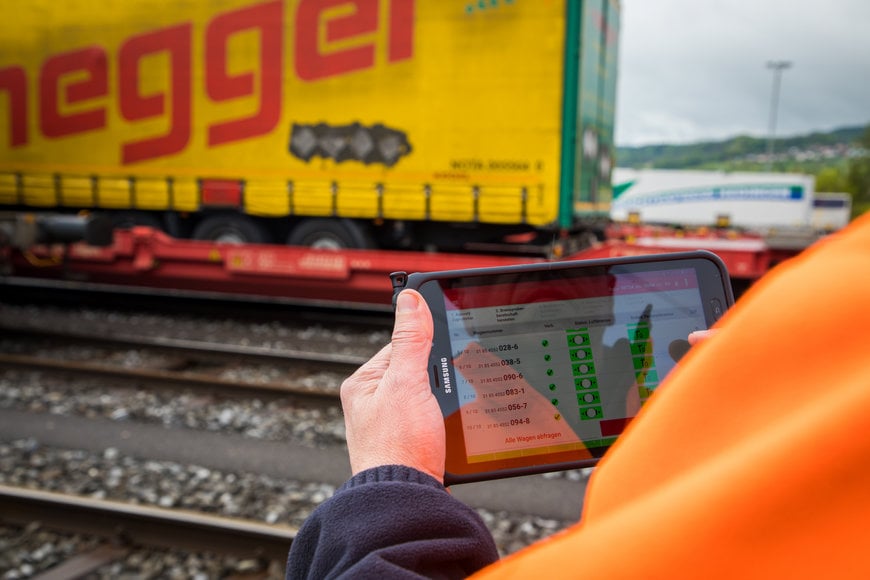railway-international.com
21
'22
Written on Modified on
PJM‘s reference system in European rail freight:System of automatic brake testing and semi-automated train preparation homologated
PJM‘s innovation auto-mated brake testing has been evaluated by TÜV and positively approved without further conditions

Credit: SBB Cargo, free of charge
Hence, it is the first system in Europe meeting all technical and formal criteria and already undergoing widespread operational testing. The system for automatic checking of the wagons’ brakes and semi-automated train preparation is in use on more than 200 SBB Cargo freight wagons and 18 DB Cargo wagons as part of the AmaBPro project. Thanks to its design, it is also possible to expand the brake testing system to include future, safety relevant applications and automated processes: „Due to the modular concept, our system can be connected with the future DAC with reasonable effort. Whichever European standard will be implemented in 2030, our system will be compatible. Thus, the urgently needed automated brake testing can be rolled out now and not just at the end of the decade,“ says Günter Petschnig, CEO of PJM.
The basis for the automated brake testing is the WaggonTracker system. The digital overall system combines monitoring functions and automated applications such as brake testing or load weight monitoring.
Thanks to in-train communication, safety relevant data is transmitted to the train driver during the train journey. The heart of the WaggonTracker is the hub generator,which autonomously supplies the freight cars with plenty of power and hence facilitates to implement further applications.
„In cooperation with SBB Cargo and Rail Cargo Austria, the vision was to completely replace the time-consuming, manual activity of checking the brakes by an automated process. In addition, the modular design of the system offers a simple, scalable digital solution that can be adapted exactly to the wagon-specific requirement. Today we have a functioning and reliable automated brake testing system, yet it is the platform for tomorrow’s techni cal applications”, say Günter Petschnig and Martin Joch, CEO of PJM.
Automation is taking shape in European rail freight. Interest in automated brake testing has increased sharply, as has demand for automatic load weight monitoring. The motives have long been known: The shortage of skilled workers and shunting personnel,which will intensify in the coming years due to demographic developments, the urgently needed boost in efficiency, and the increase in cost-effectiveness in order to be able to achieve the increase in rail transport set in many European countries in the coming years.
„The well enough known problems and challenges of rail freight transport can only be solved in the medium term by automation.The real implementation can start promptly,“ says Günter Petschnig.
Implementation steps at a glance
► The automated brake testing system is an innovation by the development alliance of SBB Cargo, PJM and Rail Cargo Austria. Currently, the system is integrated in real operation by SBB Cargo and RCG has a prototype train equipped with the automated system. Within the project AmaBPro, a pilot train of DB Cargo will be equipped with the PJM system and then operationally tested. AmaBPro is part of the program “Future Rail Freight Transport” initiated by the Federal Ministry of Transport and Digital Infrastructure. In addition, Mercitalia Intermodal will have a pilot train for intermodal transport.
► For SBB Cargo, the automatic brake test is an important part in the „one-person operation“ automation project. The other two parts are the early collision warning system and the automatic coupling.
► The automated brake test meets all safety-relevant specifications in terms of operation and vehicle.
► Since 08/2017, the pilot trains have been running at SBB Cargo. By the end of the testing, the wagons will have completed 1,000,000 kilometres. The brake test will be performed 500 times and the brakes of all wagons will have been tested 10,000 times.
► By now, SBB Cargo has equipped around 200 wagons with the automated brake testing system.
► 09/2021: Product development is completed.
► 02/2022: Positive evaluation without further conditions and homologation by TÜV.
► In spring 2022, SBB Cargo is working on series operation. The operational processes are adapted to the new automated system, for example in the areas of training, IT or workshop.
www.pjm.co.at

